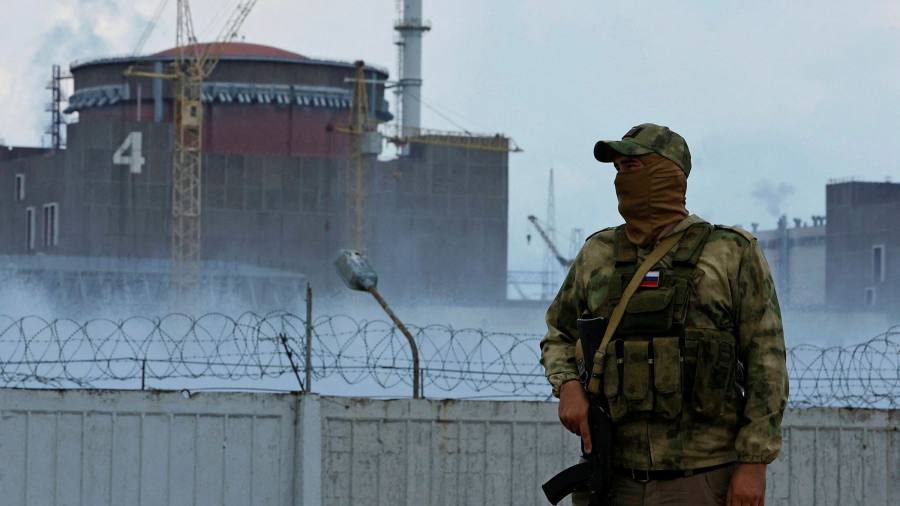Artillery barrages hit Europe’s largest nuclear power plant, located in Russian-occupied territory in southern Ukraine, over the weekend, sparking international fears of the risk of radioactive leaks.
Saturday’s bombardment damaged radiation sensors after hitting near a spent fuel storage facility at the Zaporizhzhia nuclear power plant, Energoatom, Ukraine’s nuclear energy holding company, said on Sunday. Each side blamed the other for the attack.
No radioactive leak was reported. But the growing concern over the threat came as the situation in Ukraine’s Black Sea ports appeared to be improving, with another convoy of ships carrying agricultural exports setting sail on Sunday.
Russia’s Interfax news agency on Sunday quoted Russian occupation forces blaming Ukraine for carrying out the bombardment and confirmed that a location near the spent nuclear fuel repository had been hit.
In a statement, Energoatom said the Russians fired rockets at the plant.
The development follows two bombing incidents late last week that prompted the UN’s nuclear security watchdog to sound the alarm and call for a team of independent experts to come to the central.
Rafael Mariano Grossi, director general of the International Atomic Energy Agency, said on Saturday that he was “extremely concerned about the bombings. . . which underscores the very real risk of a nuclear disaster that could threaten public health and the environment in Ukraine and beyond”.
He described the incident as “the latest in a long series of increasingly alarming reports” and warned that “any military firepower directed at or from the installation would be tantamount to playing with fire, with consequences potentially catastrophic”.
On Sunday, he said in a tweet that “the IAEA team must go to Zaporizhzhia. . . We can set up a safety, security and safeguards mission and provide the essential assistance and impartial assessment that is needed.
The Zaporizhzhia power plant is one of the four operating nuclear power plants in Ukraine. These are in addition to the decommissioned Chernobyl facility, site of the world’s worst nuclear accident in 1986, when the country was under Soviet rule.
Following a phone call on Sunday with European Council President Charles Michel to discuss the situation in Zaporizhzhia, Ukrainian President Volodymyr Zelenskyy said: “Russian nuclear terrorism requires a stronger response from the international community – sanctions against Russian nuclear industry and nuclear fuel”.
Josep Borrell, the EU’s foreign policy chief, said in a tweet on Saturday: “The EU condemns Russia’s military activities around Zaporizhzhia”, adding: “This is a serious and irresponsible violation nuclear security rules and another example of Russia’s disregard for international standards. ”
Energoatom on Sunday repeated its calls for Russian forces to withdraw from the plant, located in the southern coastal region occupied by Russian forces.
On Sunday, a ship carrying Ukrainian agricultural products left the Black Sea. © Nina Lyashonok/AP
“Russian forces are likely using the nuclear plant to play on Western fears of a nuclear disaster in Ukraine in an effort to degrade Western willingness to provide military support to a Ukrainian counteroffensive, while effectively using the plant as a shield nuclear weapons to prevent Ukrainian strikes against Russian forces and equipment,” the Institute for the Study of War, a Washington-based think tank, said Sunday.
Heightened tensions around the plant came as Ukraine reported that four other commercial vessels carrying Ukrainian grain for export left ports in the Odessa region on Sunday. They follow the first four shipments of Ukrainian grain across the Black Sea that began last week as part of a UN-brokered deal with Turkey aimed at breaking Russia’s decades-long naval blockade of Ukrainian trade. month.
Kurt Volker, a fellow at the Center for European Policy Analysis and former US special envoy to Ukraine, said the increased supply of longer-range weapons to Ukraine has made the Black Sea “calmer by repelling Russia’s naval presence and, in turn, opening a corridor for renewed grain exports.
But he said the escalation of hostilities in southern Ukraine – including at the Zaporizhzhia plant – amounted to Russia instilling fear in order to persuade the international community to put pressure on Ukraine to that it does not use the advanced weapons supplied by the West to retake the territory. “I think the international community sees clearly,” he added.
Additional reporting by Mehul Srivastava in Odessa


